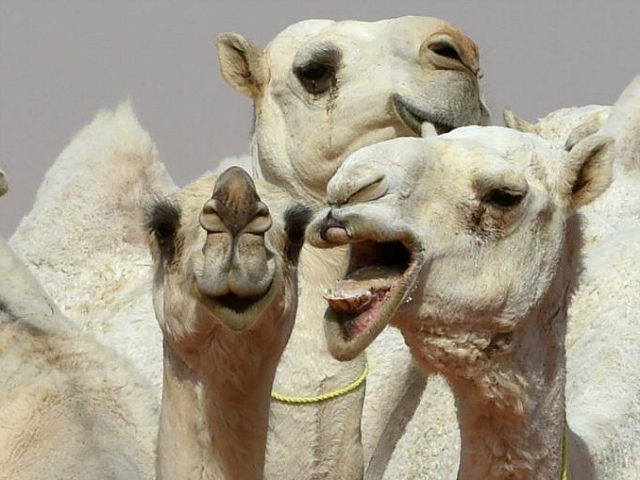A scientist from the United Arab Emirates (U.A.E.) is injecting dead samples of the Chinese coronavirus into camels to study antibodies produced by the animals in response, Al Arabiya reported on Monday.
Dr. Ulrich Wernery, a Dubai-based veterinary microbiologist and director of the emirate’s Central Veterinary Research Laboratory, is leading a team of researchers investigating how coronavirus antibodies produced by dromedaries could possibly provide insight into creating potential treatments for the Chinese coronavirus in humans.
The dromedary, also known as the Arabian Camel, is the tallest of the three camel species and has a single hump on its back. Dromedaries were identified as an animal reservoir for MERS-CoV, or Middle East respiratory syndrome (MERS), during the first reported MERS outbreak in humans in Saudi Arabia in 2012. MERS-CoV is a coronavirus related to SARS-CoV-2, which is the virus causing the disease known as “COVID-19” or the Chinese coronavirus.
“With COVID-19 [Chinese coronavirus], the virus cannot attach to the camels’ mucosa cells of the respiratory tract as the receptor is absent or dull,” Wernery told Al Arabiya on May 3. “This is because camels do not have the virus receptor – a host cell recognized by the virus as a gateway to entry in the cell – that humans and other animals have which leave them vulnerable to COVID-19 [Chinese coronavirus].”
Special antigen-binding sites produced by camels known as VHHs “reduce viral loads … by blocking the ligand-receptor interactions,” according to a study titled, Perspective on therapeutic and diagnostic potential of camel antibodies for coronavirus disease-19 (COVID-19). The biotechnology journal 3Biotech published the study on January 22.
Wernery told Al Arabiya on Monday he hopes his dromedary antibody study provides further insight into the Chinese coronavirus and potentially provides an alternative treatment option for humans.
“We have [injected] our camels with a dead COVID-19 virus to produce antibodies and we use this blood to establish better tests for the diagnosis for COVID-19 [Chinese coronavirus],” the scientist said.
“We hope that maybe one day we can use the blood — the antibodies — from camels to treat humans against COVID-19 [Chinese coronavirus] infections,” Wernery said. “This is all in the pipeline.”
A recent study supported by biomedical research program funding from the Weill Cornell Medicine College in Qatar and by the Qatar National Research Fund “identified the presence of SARS-CoV-2 cross-reactive neutralizing antibodies in dromedary camels that were not previously immunized with SARS-CoV-2 antigens.”
“Our findings advocate for the development of SARS-CoV-2 hyperimmune camels as a prominent source of therapeutic agents for the prevention and treatment of COVID-19 [Chinese coronavirus],” the authors of the study, published on February 2, wrote.
“With adequate testing and clinical trials, the proposed SARS-CoV-2 camel serum-based serotherapy could have a major impact as a preventive and curative intervention for COVID-19 [Chinese coronavirus],” the authors continued.
“By taking advantage of the unique features of the camel immune system, the suggested intervention might provide protective passive immunization in humans before and after exposure to SARS-CoV-2 and in patients with established disease, thus helping alleviate the burden of the current pandemic,” the researchers concluded.

COMMENTS
Please let us know if you're having issues with commenting.